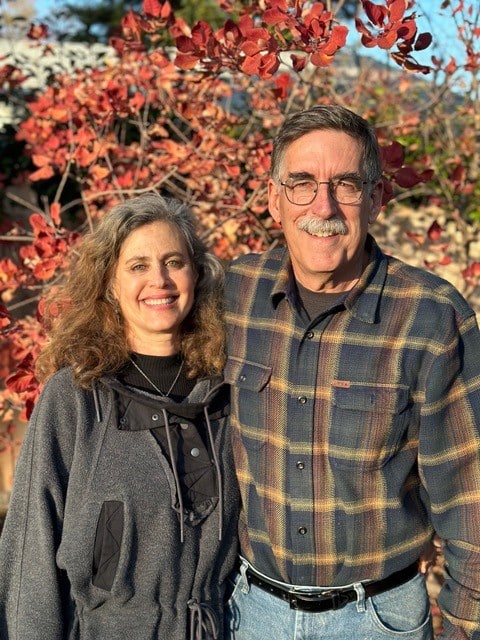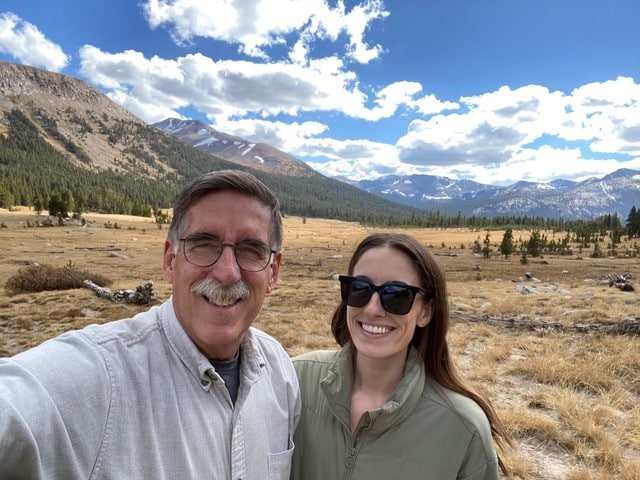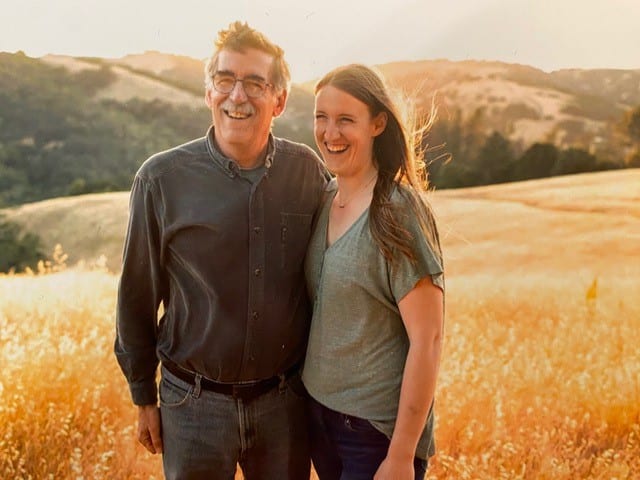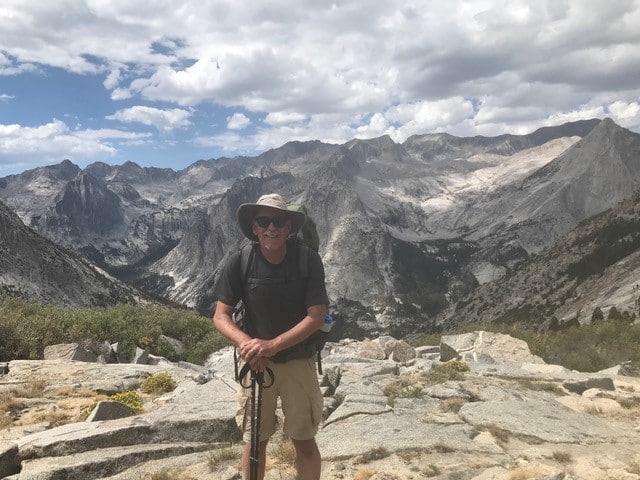Larry, Mantle Cell Lymphoma
Larry, Mantle Cell Lymphoma
During my now-concluded 33-year career with the California Coastal Commission, I was fortunate to have excellent health insurance, allowing me to obtain annual physical exams and benefit from preventive care programs at Kaiser Northern California. I had my share of minor health issues common to most men, and until the summer of 2017 at the age of 62, I had avoided life-altering medical issues. I was in excellent health, physically active, and looking forward to my annual week of camping and backpacking in the Sierra Nevada of eastern California each September.
My primary care physician called me on a Saturday morning in August 2017, the day after my annual physical exam. This call was an odd occurrence, but he explained that one of the blood test results he’d just received was unusually elevated. He asked me to return to the lab for a repeat test and several other blood tests, including flow cytometry and cytogenetics. I replied that I’d do that early the following week. He countered that I should get back to the lab sooner – as in right after our phone call ends. That caught my attention.
I received a follow-up call from my physician later that day, explaining that the original blood test result – in particular, my total white blood cell count (WBC) – was confirmed as accurate by the follow-up test. He stated that my WBC of 44,000 indicated that I likely had a form of leukemia or lymphoma, and that I would hear from the oncology department in a few days to schedule an appointment. This was not the news one ever wants to receive on a summer Saturday afternoon (or any other afternoon in any other season).

Over the next week, additional blood test results arrived, a bone marrow biopsy was scheduled, and my wife Ivy and I met with my oncologist, Zuo Ming Huang, M.D., PhD., at Kaiser Northern California. By the end of August, these test results confirmed that I had mantle cell lymphoma (MCL), in particular, a leukemic non-nodal subtype present in my peripheral blood and bone marrow. This typically can act as an indolent slow-growing form of MCL, and fortunately, a CT scan showed no lymphadenopathy or evidence of malignancy within the chest, abdomen, or pelvis. But while I had none of the physical symptoms typically associated with MCL, the cytogenetic test results gave us pause. Those results documented the deletion of the TP53 gene on chromosome 17p, which was reported to be associated with aggressive disease in patients with leukemic non-nodal MCL. This was certainly less-than-ideal news.
Dr. Huang then began consulting with colleagues and MCL specialists about the most appropriate therapy for my rare MCL presentation, including standard chemo-immunotherapy, a clinical trial using experimental drugs, and delaying treatment to follow a “watch and wait” protocol. At the same time, I continued my own research on MCL therapy alternatives, while following Dr. Huang’s directive to avoid reading any published literature more than five years old, as the field was changing rapidly.
And then some good news finally arrived after a month of nothing but bad news. I discovered the Lymphoma Research Foundation’s website in mid-September. There was an LRF Workshop scheduled in November in Seattle, and a session on MCL was on the agenda. We immediately decided to attend this event rather than LRF’s October Educational Forum in Brooklyn, New York, based purely on travel distance.
However, in late September I discovered the journalist Jonathan Alter’s 2007 essay about his battle with MCL. At Ivy’s insistence, I emailed Mr. Alter and received a near-immediate response. He suggested I contact his oncologist, Andrew D. Zelenetz, MD, PhD, at Memorial Sloan Kettering Cancer Center in New York City. After emailing Dr. Zelenetz in early October, he also quickly replied and strongly suggested we attend the Educational Forum in Brooklyn. He noted that there were MCL sessions on the agenda and that we would have opportunities to meet him and other MCL specialists and learn firsthand about the latest treatment alternatives.
Ivy and I attended the Forum. The lymphoma sessions, particularly the breakout sessions on MCL, exceeded our expectations. The information answered so many of our questions regarding treatment alternatives, including the pros and cons of “watch and wait.” We were able to meet Dr. Zelenetz, Brad Kahl, MD, (Washington University, St. Louis), and other MCL specialists who kindly took time during the Forum to discuss my MCL presentation with Ivy and me.
While they reminded us that they were not making a formal treatment recommendation, they each independently stated that “watch and wait” was a logical course of action while I remained in good health and free of symptoms. In addition, we had excellent discussions with other attendees, MCL patients, and LRF staff. We returned home with a greater understanding of MCL and treatment options, thankful for discovering LRF, and feeling much more hopeful about the future.
After the great success we enjoyed in Brooklyn, we decided to also attend LRF’s November Lymphoma Workshop in Seattle. We attended the MCL session and met with lymphoma specialists who after hearing about my MCL presentation also supported “watch and wait” as an appropriate alternative for me. I then shared with Dr. Huang the information I obtained from these two LRF conferences and she shared with me the results of her outreach to MCL specialists.
We both agreed that given my lack of symptoms and my otherwise good health that “watch and wait” (along with monthly blood testing) was the best course of action for me. Having said that, it still took a few more months of continued good health with no MCL symptoms to completely accept the idea that not starting treatment for my cancer was the best decision.
Life then returned to semi-normal in December and my good health remained unchanged. Monthly blood tests over the next year showed a steady increase in my WBC but normal results for all other tests. We attended LRF’s October 2018 Educational Forum in Manhattan Beach in southern California for more MCL sessions, informal consults with MCL specialists who again confirmed “watch and wait” as appropriate, and informative discussions with several other MCL patients who were also on “watch and wait.”


An additional benefit was meeting Steven Rosen, M.D., currently the Executive Vice President and Director Emeritus, Comprehensive Cancer Center and Beckman Research Institute, City of Hope National Medical Center. We discussed my MCL situation with Dr. Rosen and he suggested that we keep in touch as City of Hope was doing exciting research on MCL. We did just that and my discussion with Dr. Rosen at the LRF Forum would later prove to be a crucial event in my MCL path.
I remained on my “watch and wait” program with monthly blood work throughout 2019 and 2020. My WBC continued its steady rise and reached 240,000 in July 2020, and bone marrow biopsies in the fall of 2019 and 2020 showed 40% and 60% MCL involvement, respectively. And yet my good health remained unchanged with no physical symptoms of MCL. (In addition, Ivy and I never tested positive for COVID-19). However, my rising WBC indicated to me and Dr. Huang that the time for active therapy was likely approaching.
In October 2020 as my WBC topped 320,000, Dr. Huang investigated potential drug therapies for MCL, and I contacted Dr. Rosen, who then put me in touch with his colleague Alexey Danilov, M.D., Ph.D., the Associate Director of the Toni Stephenson Lymphoma Center at City of Hope. After reviewing my MCL records from Kaiser, Dr. Danilov told us in a video consult in mid-October that my WBC was worrisome, that the genetics of my MCL were problematic, and that participation in a clinical trial under development at City of Hope for MCL patients who have not received any previous treatment was the best option for controlling my WBC and bone marrow involvement. Dr. Huang agreed that if I was able to enroll in such a clinical trial at City of Hope, I should do so given the rare particulars of my MCL.
The clinical trial started in late March 2021 at City of Hope. My WBC had reached 440,000 and while I was still symptom-free I anticipated that the next few months would likely be challenging as my body responded and adapted to the trial drugs. Thankfully, significant difficulties, primarily dealing with the gastrointestinal tract, lasted for only a few months.
By September my WBC was back in the normal range, the bone marrow was clean, and my minimal residual disease test result was negative. I was in remission. This was as hard to believe as was the initial diagnosis five years earlier. I was under no illusions that I was anywhere near being cured but this was a remarkable development. I continued my monthly visits to COH for infusion, blood work, and consultation with Dr. Danilov. I remained healthy, Covid-free, and thankful that my WBC remained in the normal range through September 2022.
However, the situation changed in November of that year with a WBC of 20,000 and a count of nearly 60,000 in December. During what turned out to be my last visit to City of Hope in January 2023, my WBC was at 102,000 and MCL bone marrow involvement sat at 75%. This meant that my MCL had developed resistance to the clinical trial drugs, and I therefore had to withdraw from the trial.
While extremely disappointing, I was fortunate that Dr. Danilov and Dr. Huang agreed on a Plan B for treating my relapsed MCL. I started oral zanubrutinib therapy in February 2023 through Kaiser Northern California. The WBC steadily decreased to 10,100 in December 2023 and I continue to remain symptom-free.

The chronology of my six-year-long MCL pathway seems to be straightforward and crisis-free. Receive diagnosis, meet with oncologists, obtain second opinions on treatment options, decide how to proceed, implement “watch and wait,” start treatment, enter and exit remission, start new treatment, all the while remaining symptom-free.
However, this medical accounting is silent regarding the emotional trauma that visited me during the initial months after my diagnosis. How do I tell my wife and two siblings that I have cancer? How do I tell my two daughters that I have cancer, 24 years to the month after their mother died of cancer when they were just three and two years old? How do I reassure them that I’ll be fine after promising them for years that after losing their mother nothing bad would ever happen to me? How do I decide which friends and colleagues should hear about my cancer diagnosis, complicated by the fact that I was healthy and symptom-free and didn’t want to be the recipient of worry and sympathy, however well-intended?
Those were hard questions and difficult times during the fall of 2017. To cope with those challenges, I relied in part on a memory that helped me when my late wife Sue died: it’s not so much why has this happened to me but rather, how do I move forward into the future given this turn of events. Fortunately for me, I was blessed with a loving family close at hand, and a small circle of friends and colleagues who helped and supported me right from the beginning. I can only imagine how much more difficult and frightening it must be if one must go through this type of medical journey alone. I’ve been spared that nightmare.
I was also blessed by the most talented and compassionate oncologists and other medical personnel at Kaiser Northern California and City of Hope, and thankful for the seamless coordination between these two institutions. The advice and guidance I received regarding the “watch and wait” protocol during those early months after diagnosis preserved my options for future therapies and ultimately made it possible for me to enroll in the MCL clinical trial at City of Hope which brought me into a first remission. I was also very fortunate to be a beneficiary of the knowledge developed in previous MCL clinical trials, which underscores again the need for patients to participate in clinical trials in order to develop and enhance therapies.
Discovering the Lymphoma Research Foundation opened so many doors for me.
Discovering the Lymphoma Research Foundation opened so many doors for me to understand MCL, to meet friendly and helpful oncologists at numerous in-person and virtual meetings over the years, and to help me realize I was not facing a looming death sentence. However, I do confess to occasionally wondering if and when the “no symptoms” bubble will burst and the MCL will awaken and make me sick. It’s hard at times to accept that I have this rare type of cancer while not being sick like so many MCL patients that I’ve met over the years. But I’ve been successful in usually keeping those thoughts packed away, because I remain healthy and because I have Ivy, Claire, and Jill loving and believing in me. If and when my MCL changes course, I’m confident that the past six years have strengthened me and prepared me for whatever medical challenges might await me. But for now, life is good and I am so grateful for all that I have.